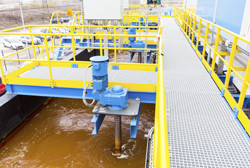Turning waste and pollutants into fuel
Pharmaceuticals and personal care products (PPCPs) are common environmental pollutants that are particularly difficult to clean from wastewater. There is a need for more advanced remediation systems that can clean PPCPs from urban waste streams. The EU-funded BIOAOPBDIES project aimed to build biological reactor systems that could remove PPCPs from waste water, as well as use these waste products as a precursor for biodiesel production. This project relied heavily on chemical processes coupled with biological organisms. Researchers investigated two biological systems to degrade PPCPs: a microbial ecosystem from a wastewater treatment plant, and a commercially available combination of fungi. They also tested two different types of bioreactor to optimise the elimination of PPCPs. Another aspect of the project looked at whether the degraded PPCPs could be useful for biodiesel production. Researchers optimised the production of methyl ester (a key precursor of biodiesel) from leftover microbial cultures, leftover fungal biomass and wastewater treatment plant sludge. By the end of the project, BIOAOPBDIES proposed a novel system that could eliminate PPCPs and provide materials for biodiesel production. This system holds promise for reducing environmental pollution and fossil fuel reliance.
Keywords
Bioreactor, biodiesel, pharmaceuticals and personal care products, wastewater



